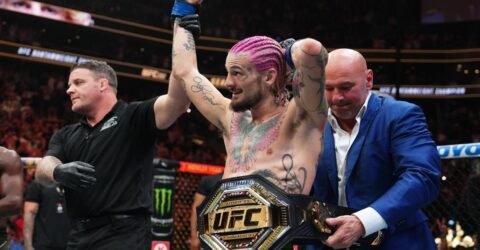Jeff Molina’s suspension has sent shockwaves through the MMA community following revelations of his involvement in a significant UFC betting scandal. The 27-year-old flyweight received a 36-month suspension from the Nevada Athletic Commission, stemming from his connection to coach James Krause and the questionable circumstances surrounding teammate Darrick Minner’s injury prior to his fight against Shayilan Nuerdanbieke. The controversy arose when betting lines shifted dramatically just before the bout, raising flags around wagering activities on UFC events. Molina faced the commission after being implicated for failing to disclose Minner’s injury, which led to him placing bets on the fight outcome. This shocking turn of events not only affects Molina’s career, as he won’t be eligible to fight until November 2025, but it also highlights ongoing issues regarding transparency and ethics in MMA betting.
The recent sanction imposed on Jeff Molina marks a noteworthy moment in the ongoing scrutiny of betting practices in professional mixed martial arts. This suspension, part of a broader investigation involving prominent figures like James Krause and the suspicious circumstances surrounding Darrick Minner’s injury, has raised serious questions about integrity within the UFC. As fans and analysts alike dissect the implications of this case, the involvement of the Nevada Athletic Commission has underscored the necessity for stricter regulations to prevent any potential corruption in the sport. Molina’s ban, which will keep him on the sidelines for the next three years, serves as a significant reminder of the potential consequences for fighters who fail to uphold ethical standards in their sport. With these developments shaking the foundation of UFC competitions, many are wondering how this will reshape future policies and fighter conduct.
Jeff Molina Suspension Details and Implications
Jeff Molina’s suspension, issued by the Nevada Athletic Commission, highlights the serious consequences that can arise from involvement in the UFC betting scandal. Set to last for 36 months, this suspension arose primarily from Molina’s failure to disclose the significant injury suffered by his teammate Darrick Minner before a crucial fight. The Nevada Athletic Commission’s decision represents a firm stance against illicit betting practices within the sport and serves as a warning to other fighters about the importance of transparency and adherence to regulations.
Molina’s sanction also includes the requirement to pay prosecution fees amounting to $235.56. With this ruling made retroactive to November 5, 2022, Molina will not be eligible to compete until November 5, 2025. This extended absence from the Octagon not only impacts his career trajectory but raises questions about how athletes should approach training and competition in an environment where betting irregularities can have dire repercussions. Fighters in the UFC must maintain integrity in their interactions with coaches and teammates to avoid similar pitfalls.
The Role of James Krause in the Betting Scandal
James Krause’s involvement in the betting scandal has sparked significant controversy within the UFC community. As Molina’s coach, Krause’s actions have been scrutinized extensively, especially following the abrupt changes in betting lines prior to Darrick Minner’s fight against Shayilan Nuerdanbieke. Allegations surfaced that Krause had knowledge of Minner’s injury before the fight, leading to suspicions of potential foul play. The UFC swiftly severed its ties with Krause, warning fighters against training under him to protect the integrity of the sport.
This situation underscores the delicate balance that fighters must maintain between training and competitive integrity. The repercussions of Krause’s influence have reverberated throughout the UFC, highlighting a broader issue regarding how coaches and fighters interact with betting entities. The Nevada Athletic Commission’s response to Krause and his associates demonstrates the seriousness with which regulators view these allegations, indicating that future violations will not be overlooked.
Darrick Minner’s Injury and Its Consequences
Darrick Minner’s injury played a crucial role in the unfolding of the betting scandal that enveloped Jeff Molina and James Krause. After Minner suffered a first-round TKO loss at UFC Vegas 64, it was revealed that there had been significant changes in the betting lines alarmingly close to the fight time. This incident led the Nevada Athletic Commission to launch an investigation to determine if there was any deceptive conduct involved in the way the fight was handled.
Minner’s failure to report the injury prior to his fight has had far-reaching consequences, not just for himself but also for his teammates. The revelations around how the injury was managed and the subsequent betting behavior have led to a complete reevaluation of how injuries and wagering are regulated within the sport. Minner, like Molina, must now contend with the fallout of this situation, as they navigate their future careers in a sport where integrity is paramount.
The Nevada Athletic Commission’s Response to Betting Irregularities
The Nevada Athletic Commission has taken a proactive stance against betting irregularities in the UFC, illustrated by its decisive actions involving Jeff Molina and the broader zodiac concerning James Krause and Darrick Minner. By implementing strict sanctions, including suspensions and financial penalties, the commission aims to uphold the sport’s integrity and protect athletes from the ramifications of illicit betting activities. This vigilance reflects the organization’s commitment to ensuring fair competition.
In addressing the issues surrounding the betting scandal, the commission has signaled its intention to thoroughly investigate any allegations that could tarnish the reputation of mixed martial arts. The suspension of Molina and the investigation into Krause’s conduct are significant steps in reinforcing regulatory oversight and ensuring that all fighters compete on a level playing field. The commission’s actions will likely set a precedent for how such matters will be handled in the future.
Molina’s Fight Eligibility Post-Suspension
Following his 36-month suspension, Jeff Molina’s eligibility to fight will resume on November 5, 2025, marking a significant period of absence from competitive fighting. The implications of this suspension stretch beyond Molina’s immediate career, as he will have to work diligently to regain his position in the UFC after such a lengthy hiatus. With the stakes raised in the current landscape of MMA, it will be essential for Molina to demonstrate his commitment to the sport and compliance with regulatory standards.
As the sport of MMA continues to evolve, fighters must be particularly aware of the regulatory frameworks governing their actions. Molina’s return to the Octagon will depend not only on his physical readiness but also on how well he navigates the rebuilt landscape of fighter conduct amid stricter scrutiny over betting practices. His ability to come back strong will likely shape perceptions of his career, as the betting scandal’s shadow lingers.
The Impact of the UFC Betting Scandal on Fighters
The fallout from the UFC betting scandal has generated considerable anxiety among fighters regarding the potential ramifications of their actions outside the cage. The cases of Jeff Molina and Darrick Minner have opened a dialogue about the importance of maintaining ethical standards, particularly concerning betting practices that could compromise the integrity of the sport. Athletes must remain vigilant and ensure that their relationships with coaches and associates do not lead to conflicts of interest.
Fighter awareness of betting irregularities is essential as the UFC seeks to regain public confidence in the sport. The scandal has highlighted the necessity for comprehensive education and training for fighters regarding their responsibilities to the Nevada Athletic Commission and the implications of any undisclosed injuries. Moving forward, the UFC will be expected to enforce stringent protocols to protect both fighters and the integrity of the sport.
The Long-Term Effects of Suspension on Molina’s Career
Jeff Molina’s 36-month suspension not only halts his career progression but also poses existential questions about his long-term viability as a competitive fighter. The time spent away from the Octagon can lead to a decline in skills and may impact his marketability once he is eligible to return. This enforced pause could have repercussions on his physical conditioning and mental readiness, as maintaining peak performance levels becomes increasingly challenging during extended breaks.
Additionally, the weight of being entrenched in a betting scandal may tarnish Molina’s reputation, affecting his relationships within the industry. Other fighters and potential sponsors may view him with skepticism based on his previous involvement in the incident. Molina will need to strategically craft a narrative of redemption and commitment to integrity as he prepares for his return to MMA competition.
Understanding Regulatory Measures in MMA Fighting
The regulatory measures implemented by bodies such as the Nevada Athletic Commission play a critical role in ensuring that mixed martial arts remains a respected sport. These regulations are aimed at preserving the fairness and integrity of competitions while protecting fighters from exploitation through unsanctioned betting practices. The recent controversy surrounding Jeff Molina and his suspension underscores the importance of participants adhering to established guidelines for fighters, coaches, and related stakeholders.
Moreover, understanding these regulations empowers fighters to make informed decisions in their professional careers. By familiarizing themselves with the potential consequences of actions related to betting and injuries, fighters can better navigate the complexities of their roles. Regulatory bodies continuously seek to adapt their measures in response to emerging challenges in the sport, ensuring a clear framework for all involved.
Preparing for a Return to Competition: Molina’s Path Forward
As Jeff Molina faces his three-year suspension, his journey back to competition will require significant planning and dedication. Once eligible to fight again, it will be vital for him to demonstrate not only physical readiness but also a commitment to upholding ethical standards moving forward. This may involve public outreach, connecting with fans, and building a positive reputation within the MMA community to distance himself from the scandal.
Molina could benefit from engaging in a rigorous training regimen, aligning himself with reputable coaches, and actively participating in community engagement activities to foster a rehabilitated image. Furthermore, reviewing lessons learned from the betting scandal will be instrumental in guiding his decisions in the future, ensuring that he maintains integrity and transparency in all aspects of his fighting career.
| Key Point | Details |
|---|---|
| Suspension Duration | 36 months due to the betting scandal. |
| Reason for Suspension | Involvement in the betting scandal related to teammate Darrick Minner’s fight. |
| Fine | Molina is required to pay $235.56 in prosecution fees. |
| Investigation Launch | Initial suspension was back in December 2022 following allegations of betting irregularities. |
| Teammate Situation | Darrick Minner lost to Shayilan Nuerdanbieke by TKO, leading to investigations after suspicious betting activity. |
| Eligibility to Compete Again | Eligible to compete after November 5, 2025, due to retroactive suspension. |
| James Krause’s Status | Banned from UFC and fighters coaching or training with him face removal from events. |
| Molina’s Silence | Molina has remained silent and was removed from the UFC roster in January 2023. |
Summary
The recent suspension of Jeff Molina has drawn significant attention within the MMA community. Molina has been handed a 36-month suspension due to his involvement in a betting scandal linked to his coach, James Krause. The situation escalated following an investigation into irregular betting on the fight of his teammate, Darrick Minner, which raised concerns about gaming integrity in UFC events. As the landscape of UFC continues to evolve with strict regulations, Molina’s case highlights the serious implications of compliance and ethics in sports. He will not be eligible to return to competition until November 2025, marking a critical period in his career.







